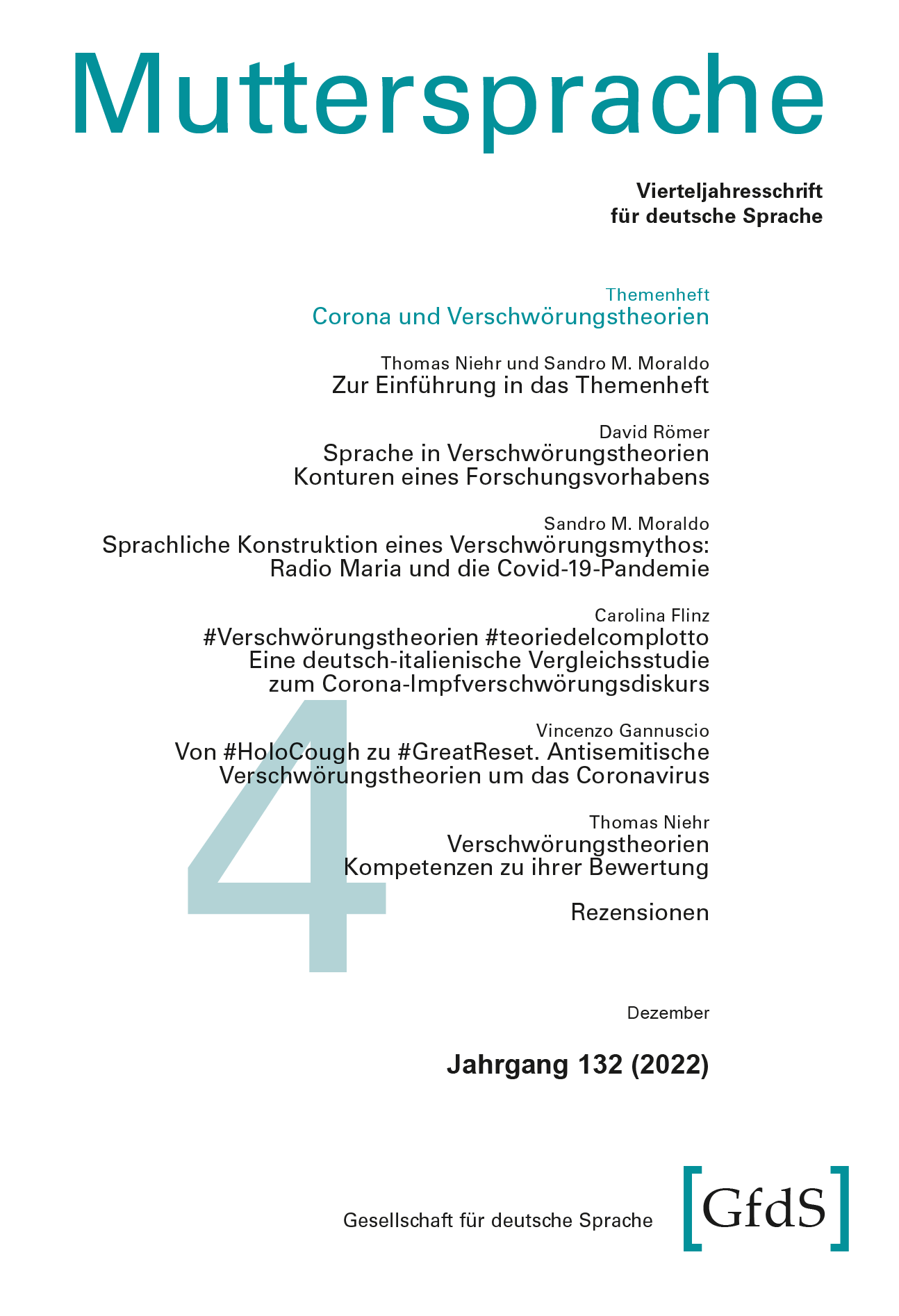Artikeldetails
freier Zugang*Carolina Flinz: #Verschwörungstheorien #teoriedelcomplotto. Eine deutsch-italienische Vergleichsstudie zum Corona-Impfverschwörungsdiskurs (MU)
(Corona und Verschwörungstheorien)

Produkttyp: Beitrag (Zeitschrift)
Autor(in): Carolina Flinz
Titel: #Verschwörungstheorien #teoriedelcomplotto. Eine deutsch-italienische Vergleichsstudie zum Corona-Impfverschwörungsdiskurs
Publikation in: Muttersprache, 132. Jahrgang, Heft 4
Seiten: 331–347 (17 Seiten)
Erschienen: 15.12.2022
Abstract: siehe unten
URI: https://doi.org/10.53371/60414

Preis: kostenfrei
(Download)
Abstract
Gegenstand dieses Aufsatzes ist eine interlinguale Analyse eines deutsch-italienischen ad hoc erstellten Vergleichskorpus von Texten zum Corona-Diskurs aus den Sozialen Medien mit Fokus auf das Thema der Impfungen, das vielfältig in allen Medien und besonders im Netz diskutiert wird. Verschwörungstheorien, wie es oft bei der Aushandlung komplexer Sachverhalte der Fall ist, werden auch zu diesem Thema stark verbreitet. Trotz möglicher Unterschiede haben sie gemeinsam, dass ihre Urheber sich von der Elite und dem Mainstream abgrenzen und dass sie von der Tatsache ausgehen, dass die Wahrheit verheimlicht wird. Ziel dieser Untersuchung ist es, die eingesetzten sprachlichen Mittel, die an der sozialen Konstruktion von Verschwörungstheorien beteiligt sind, aus diskurslinguistischer Sicht zu analysieren und sie vergleichend darzustellen. Nach einer theoretischen Einführung zum Thema Verschwörungstheorien und Diskursanalyse (Abschnitt 2) werden der methodische Zugriff und die Untersuchungskorpora vorgestellt (Abschnitt 3). Es folgen die Darstellung und die Diskussion der Analyseergebnisse (Abschnitt 4).
The subject of this paper is an interlingual analysis of a German-Italian ad hoc comparable corpus of texts on corona discourse from the social media with a focus on the topic of vaccinations, which is variously discussed in all media and especially on the net. Conspiracy theories, as is often the case in the negotiation of complex issues, are also strongly disseminated on this topic. Despite possible differences, they have in common that their originators distance themselves from the elite and the mainstream and that they assume that the truth is being concealed. The aim of this study is to analyse the linguistic means used from a discourse linguistic perspective and to present them comparatively. After a theoretical introduction to the topic of conspiracy theories and discourse analysis (section 2), the methodological approach and the focus corpora are presented (section 3). This is followed by the presentation and discussion of the results of the analysis (section 4).
*Open Access gemäß CC BY-NC-ND 4.0.